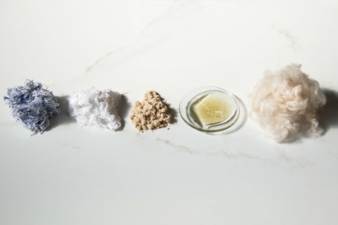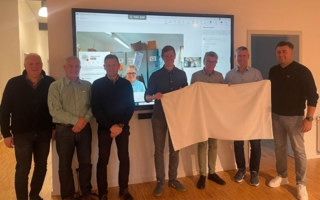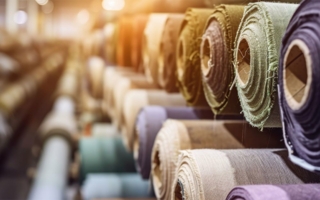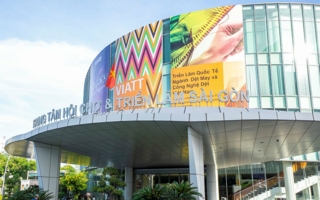28/01/2021 – Sustainability – circular economy — auf Deutsch lesen
Infinited Fiber Company: New project Going Beyond Cotton
Twelve pioneering players in the fashion and textile industries are breaking new ground with an entirely circular model for commercial garment production.
The consortium of brands, manufacturers, suppliers, innovators and research institutes participating in the European Union-funded “New Cotton Project”, will prove that circular, sustainable fashion is not only an ambition, but can be achieved today. The project also aims to act as an inspiration and steppingstone for further, even bigger circular initiatives in the industry going forward.
The New Cotton Project is an EU consortium project initiated by the Infinited Fiber Company, together with project partners Adidas, Aalto University, Fashion for Good, Frankenhuis, H&M group, Inovfil, Kipas Textiles, REvolve Waste, Rise, Tekstina and Xamk.
Circularity in textiles
Over a three-year period, textile waste will be collected, sorted and regenerated into Finnish biotechnology group Infinited Fiber Company’s unique, cellulose-based textile fibres.
The fibres will be used to create different types of fabrics for clothing that will be designed, manufactured and sold by global brand Adidas and companies in the H&M Group.
At the end-of-use, apparel take-back programmes will collect the clothing to determine the next phase in their lifecycle.
Clothing that can no longer be worn will be returned for regeneration into new fibres, further contributing to a circular economy in which textiles never go to waste, but are reused, recycled or regenerated into new garments instead.
The EU has identified the high potential for circularity within the textile industry, while simultaneously highlighting the urgent need for the development of technologies to produce and design sustainable and circular bio-based materials.
Making sustainable products commonplace, reducing waste and leading global efforts on circularity are outlined in the European Commission’s EU Circular Economy Action Plan as necessary for Europe’s efforts to drive sustainable growth.
The EU-funded New Cotton Project (CE-FNR-14-2020 – Innovative Textiles – Reinventing Fashion), with its consortium partners from Finland, Portugal, Sweden, Germany, The Netherlands, Slovenia and Turkey, directly addresses these critical issues and pioneers the implementation of a circular operating model for the textile industry.
Infinited Fiber Company’s Cofounder and CEO Petri Alava:
“We are very excited and proud to lead this project, which is breaking new ground when it comes to making circularity in the textile industry a reality. The enthusiasm and commitment with which the entire consortium has come together to work towards a cleaner, more sustainable future for fashion is truly inspiring.”
A consortium of industry leaders
Infinited Fiber Company, whose patented technology can regenerate cellulose-rich textile waste into unique fibres that look and feel like cotton, is leading the consortium of 12 companies and organisations that span the entire supply chain. Manufacturers Inovafil, Tekstina and Kipas will use the regenerated fibres to produce yarns, woven fabrics and denim respectively. Adidas and companies in the H&M Group will design, manufacture and sell clothing made from the fabrics. Adidas is also collecting customer feedback and insights, and developing its textile take-back programme to reintegrate returned apparel back into the loop.
Frankenhuis will sort and pre-process the textile waste used in this project, while the South-Eastern Finland University of Applied Sciences (Xamk) will develop a technical solution for the continuous processing of textile waste fibres for pre-treatment. REvolve Waste will collect and manage data on textile waste to estimate feedstock availability in Europe and define the grade of the used textile waste. Rise, the research institute of Sweden, will conduct the sustainability and techno-economic analyses for the project together with Infinited Fiber Company, as well as managing the eco-labelling for the project and subsequent fabrics and garments. Finland’s Aalto University will analyse the created ecosystem and circular business models more broadly to help define the most feasible business model for the project. Sustainable fashion innovation platform Fashion for Good will facilitate stakeholder cooperation and conduct training, leading all project communication, branding and dissemination with support from Aalto University and Infinited Fiber Company.
Fashion brands produce nearly twice as many clothes today as they did 20 years ago and demand is expected to continue growing. At the same time, the equivalent of one garbage truck of textiles is landfilled or burned every second.
Most of the textile industry’s environmental problems relate to the raw materials used by the industry: cotton, fossil-based fibres such as polyester, and viscose as the most common man-made cellulosic fibre, are all associated with serious environmental concerns.
The New Cotton Project is a direct response to these problems, offering a valuable solution for textile waste and an alternative to the industry’s reliance on virgin materials like cotton, which require vast areas of agricultural land, unsustainable amounts of water and polluting fertilizers and pesticides for cultivation. The project is recapturing the valuable raw materials in discarded clothing and regenerating them back into high-quality, cellulose-based fibres that can be spun into new yarn, woven into new fabric, and designed into new clothes – again and again.
As this is the first project of its kind, this is also an opportunity to identify and find solutions for potential bottlenecks to scaling up circular textile production and for calculating the environmental impacts over the lifecycle of textiles.
The New Cotton Project has received 6,745,801.25 Euro in funding from the European Union’s Horizon 2020 research and innovation programme under grant agreement No 101000559.




